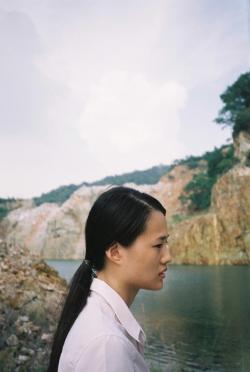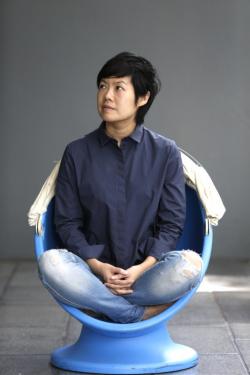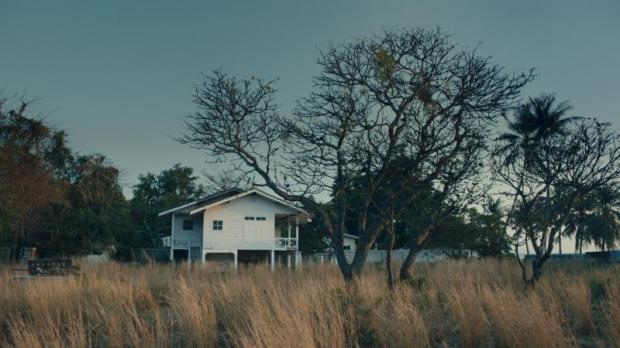Anocha Suwichakornpong's first degree is in jewellery design, but you won't see any gleaming items on her. A small woman with a pixie cut, the film director is more interested in crafting images than making necklaces (or wearing one) -- and that's good for her and even better for us on this side of the screen. On a recent afternoon she showed up to meet us, and the long talk was about film, memory, feminism, frozen ovum, political heartbreak and how the scourge of history has found a way into her latest film.
At this hour Dao Khanong (or By the Time It Gets Dark) is a hot property in the international film circuit. Anocha's film is a beautiful, puzzling narrative about a filmmaker who's making a film about Thai history and a young woman who keeps changing her job, from one lowly-paid stint to another. After its premier in Locarno, Switzerland, in July, Dao Khanong is travelling to Busan, London, Montreal, Hong Kong and many other places. In Thailand, the director will hold a special screening on Thursday -- the corresponding date to the Oct 6, 1976, atrocity mentioned in the film -- before general release in early December.
This is at heart a political film, Anocha said, because as clichéd as it may sound "everything is political" and "life and politics can't really be separated".

Dao Khanong (By The Time It Gets Dark). Anocha Suwichakornpong
But it's much more than that, too. Dao Khanong works like a strange fruit housed in multilayered peels, or perhaps a matryoshka doll that hides deeper objects inside. It's also a film whose main characters are women except one. At the beginning, we see a director who's working on a documentary film whose subject is a former student activist of the October generation in the 1970s. We see images from the film this filmmaker is supposedly shooting, including a re-enactment of the round-up of students as rifle-slinging policemen put boots on their faces. Then the narrative blooms, petal by petal, and we meet several more characters, some from real life, others from the film-within-a-film, and the lines separating them aren't clear. Another prominent character is a young woman who first works in a resort, then as a maid in a hotel, then a waitress on a boat.
Anocha wrote the first draft of Dao Khanong in 2009, right after her first feature film Jao Nok Krajok (Mundane History), a family drama centred on a disabled man and his father. The original idea concerns a woman who keeps changing her job, and her experience would reveal the larger picture of society. But along the way, the film grew along with the filmmaker. Society changed, politics shifted, and the ripples of various influences found their way into her creative process.
"I felt heartbroken when the Sept 19, 2006, coup happened," said Anocha. "I never thought people around me would support that coup to such an extent. It was my wake-up call. At that time, the opposition of the coup wasn't very strong [unlike the coup of May 22, 2014]. But there was a call for those who disagreed with it to gather at Siam Discovery, and I went."
Soon after Anocha organised a campaign, "Kissing in Public", in which people did just that -- kissed in public. One of the activities included a couple kissing outside army headquarters, right in front of a phalanx of soldiers. "They were right there but they didn't say anything. There was no suppression then," she said. "Do you think we can do something like that now? It shows how much worse things have become."

The massacre of Oct 6, 1976, at Thammasat University -- the same year in which Anocha was born -- grew into one of her major interests, especially the silence around one of the bloodiest chapters in national history. Like most Thai children, she didn't learn about it in school but through her own reading when she was 12 or 13. In 2009 she read an essay by well-known scholar Thongchai Winichakul on the subject and how the right-wingers who committed the atrocity chose to remember the incident. To Anocha, filmmaking and history have an uncanny relationship -- in Dao Khanong, the central narrative is a director trying to make a film about history. Stepping back one more level, Anocha said the process of making this film urged her to reflect on the artistic process and the way the past is recorded and remembered by society.
"I tried to find out myself why I'm interested in the process of filmmaking and in writing history," she said laughing. "Maybe because they have many things in common. To make a movie and to record history, there's fact and there's opinion mixed together. There's distortion, there's information that's both right and wrong.
"Film is image. History is memory plus information. Both film and history contain the personal and the collective. They're both also a kind of mystery."
Anocha studied jewellery design for her bachelors and cultural studies for her masters, both in London. But cinema took over and she went on to Columbia University in New York to study filmmaking. Her graduate film, Graceland, was the first Thai short film to be at Cannes Cinefondation in 2006, and her first feature-length film Mundane History in 2009 won the prize at International Film Festival Rotterdam.
That film featured an almost an all-male cast -- opposite of Dao Khanong, which focuses on women and their dealings with the world around them. With offhand frankness, Anocha said that there was a point in her life when she realised that she was a feminist, and her role as a filmmaker (not "female filmmaker") should allow her to explore stories about women and the female sensibility in meaningful ways. In Mundane History, her portrayal of the male characters is all about the way women deal with masculinity, while Dao Khanong is more direct in the way women characters express themselves -- as women and as persons.
"I'm interested in the female issues -- female equality and female representation in film, things like that," said Anocha. "I often find myself in a situation when I watch a movie with male and female friends, then we realised that what the men and the women see in the same film can be so different! Men see something as small and trivial, but women see that same thing as very important. As a filmmaker, this is what interests me and drives me."
Dao Khanong, Anocha said, is like a baby that is better than its mother. "I don't know if I 'like' it, but it fulfils me in many ways," she laughs as she says this -- the shy laughter of a childless woman who admits she wants to have a child. She adds, this time with confidence and excitement, that she's been contemplating egg-freezing and fertility preservation services because she would like to have a real baby -- not movie baby -- in the future.
"It's about hope I guess. Before, I thought I didn't want children because the world wasn't such a nice place. Now I think a child may live to see changes. If I won't be here to see those changes, someone should."

